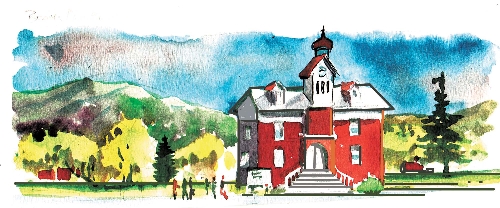Beaver, Utah, celebrates ties to pioneers, outlaw

Historic Beaver, Utah, lies along Interstate 15 in the center of an area replete with recreational opportunities. Home to about 2,800 residents, it caters to fishermen, hunters, campers, hikers, horseback riders, off-highway explorers, rock hounds and winter sports enthusiasts.
It serves as the seat of Beaver County and is the largest of several small towns where agriculture has been an economic mainstay since frontier times.
Located about 210 miles from Las Vegas, Beaver is an hour’s drive north of Cedar City. Rural routes from Beaver lead to several smaller communities and attractions such as a state recreation area at Minersville Reservoir and a scenic drive up Beaver Canyon into a mountain wonderland. Visitors to Beaver find accommodations, cafes, fuel, road services, information and charming reminders of its pioneer heritage.
Beaver was established by Mormon colonists in 1852. The first settlers came from Parowan, a day’s ride to the south. Church authorities chose the site because of its abundant supply of water from the Beaver River, the promise of minerals and building materials nearby and the fine stands of timber in the forests surrounding the 12,000-foot peaks of the Tushar Mountains to the east. Many of Beaver’s early structures were built of black stone from lava flows in the surrounding countryside.
A handsome survivor of frontier days, the three-storied Territorial Courthouse, with its clock tower and steeple, still dominates the downtown on Center Street a block east of Main Street. The courthouse, built in 1882, has a black lava foundation and red-brick walls that helped it survive a fire in 1889 and an earthquake in 1901. Threatened with demolition in the late 1970s, the courthouse was saved by concerned citizens. The Daughters of the Utah Pioneers turned the building into a museum of local history. It recently underwent a million-dollar renovation.
Open for tours in summer, the courthouse gives visitors glimpses of yesteryear in rooms furnished in 19th century style and the collections of artifacts on display, many donated by families of pioneer residents. The upper floors include the fine old courtroom, third-floor offices and access to the clockworks in the steeple tower. The inhospitable basement jail, in use until 1976, might once have held Butch Cassidy and Charles Manson before the California murders.
Famed outlaw Robert Leroy Parker, alias Butch Cassidy, was born in Beaver in 1866, the eldest of 13 children. His boyhood home still stands a couple of blocks from Main Street. The Parker family moved in 1879 to Circleville, on the other side of the mountains, where Parker served as postmaster. Beaver is proud enough of the connection to the hometown bad boy that it holds an annual Butch Cassidy Festival in July.
Every secondary road heading out of Beaver leads to adventure. The high desert and rocky ranges of the Great Basin lie westward with hundreds of miles of off-pavement trails and old roads, including the 320-mile Paiute ATV Trail. The same minerals that attracted the pioneers’ attention lure rock hounds into the hills in search of a wide variety of minerals and gemstones.
A few miles from Beaver, Minersville Reservoir offers great sport for boat fishermen. Anglers may harvest trout longer than 20 inches only and must use artificial flies or lures.
The high Tushar Range east of Beaver is an angler’s paradise with several streams, alpine lakes, trails and campgrounds within Fishlake National Forest. Glorious fall color is starting there already. Several roads accessing the high country close with winter snows. Winter brings skiers to a popular ski resort and cross-country skiers, snowmobilers and snowshoers to forest roads and trails.
State Route 153, the main road east along the Beaver River, deserves its designation as a National Scenic Byway. It runs 40 miles from Beaver over the mountains to U.S. Highway 89 near Circleville. The beautiful paved canyon route, kept open all year, leads to ski resort facilities about 20 miles from Beaver. Pavement ends there, continuing to U.S. 89 on a graded dry-weather route closed in winter.
Margo Bartlett Pesek’s Trip of the Week column appears on Sundays.